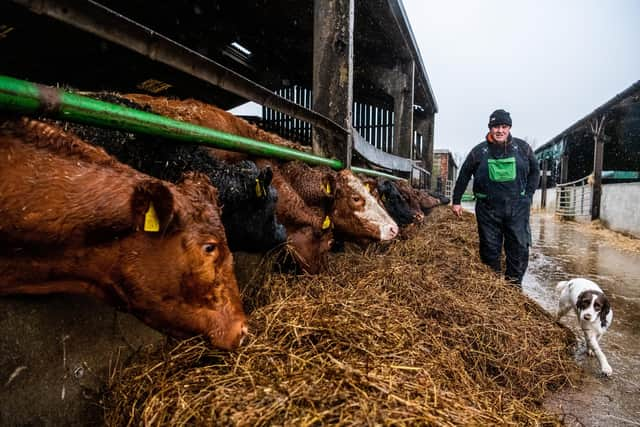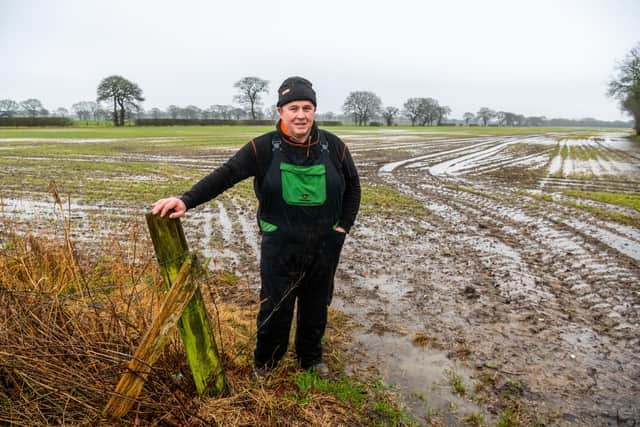Meet the straight-talking Yorkshire farmers' rep who questions how 'planting trees will help feed the country'
Andrew farms with his brother Mark and parents Tom and Jean across around 300 acres owned plus a further acreage rented with a suckler herd of Stabilisers, a stores cattle enterprise with stock coming from Metcalfe Farms near Leyburn, chickens reared on behalf of Soanes poultry, arable crops and grassland.
When his father Tom was chairman over 30 years ago the farm was mainly a dairy farming operation. The family moved out of milking cows in 1998, put up poultry sheds and reared ducks for Cherry Valley Farms for 22 years, until the company closed down in 2020.
Advertisement
Hide AdAdvertisement
Hide Ad“We’ve change in farming now that is faster and greater than we have ever seen,” says Andrew. “We’ve only to look at how the BPS has evolved into the SFI to see where farming is heading. The BPS was predominantly about food production, an acreage payment, but somebody had to farm that land to keep it in good agricultural order to produce food.


“Michael Gove came along and said it wasn’t right that land ownership should draw money merely for having land, so the government scrapped BPS, but didn’t having anything lined up as a replacement. There was a lot of uncertainty until the SFI, something that should have been brought out two years earlier.
Andrew and many farmers do not feel that what farming now has through the SFI is sending out a message that food production is any longer considered as the number one priority of farmers.
“There are changes coming in agriculture, as a consequence of SFI combined with a number of other pressures. In my father’s day farming was all about food production, but that is no longer seen as number one by the Government.
Advertisement
Hide AdAdvertisement
Hide Ad“I don’t think consequences were thought through when the scheme was developed. There are a lot of standards in the SFI, but it is not about food production.


“Whether that’s a good thing or not depends on your point of view. There are a lot more options, but many farmers are not able to use those options, particularly upland farms and permanent grass farms. There aren’t the same options as on the arable side.
“It is still predominantly a land-based payment, but it has put a lot of pressure on the already severely under pressure tenanted sector because landowners of large estates are now capturing a greater percentage of the payment than under BPS.
“Some landowners, if they’ve tenants on their land, may now be calculating that if they turf off the tenant, who may be on a short term Farm Business Tenancy, and stick the tenanted farm into some environmental scheme they could probably draw twice or three times the income.
Advertisement
Hide AdAdvertisement
Hide AdAndrew feels there are common sense questions that need answering and acting upon.
“We live on quite a small island, thick end of 70 million of us, and we all eat. If we’re making planting of such as trees on this island our priority instead of say sheep farming, where is lamb coming from?
“Are we moving our carbon footprint somewhere else? We have a fairly temperate climate where water is never scarce, droughts only last three to four months. We can grow crops and rear livestock very well.
“The moral question we need to ask is should we not be making the most of what we can feed ourselves with, like potatoes, cereals and meat production?
Advertisement
Hide AdAdvertisement
Hide AdWhile the SFI is a cause for huge concern Andrew’s even greater concern is the volatility of commodity markets and the risk being carried by farmers in growing crops and rearing livestock.
“Wheat is kicking around at a price it was prior to the troubles in Ukraine and yet those same troubles have seen fuel rise to three times the price they were, fertiliser has risen over twice the price, energy costs for gas and electricity have at least doubled and some have gone much higher. Machinery prices, everything from machines to wearing parts, have absolutely rocketed.
“All of these factors mean that if anything goes wrong, especially when you’ve so much invested, you’re very quickly into the red line on your accounts. We are all at a greater degree of risk and largely working on slimmer margins.
Somewhat ironically this has led to Andrew’s family farm at South Ross going into SFI themselves.
Advertisement
Hide AdAdvertisement
Hide Ad“We are having to go into it because it’s all we have available to take a bit of risk out. I can put clover in and we receive payment of something like £240 per acre. It will be putting fertility into the soil, but all I can do is top it. At the moment I’m using that as my break crop rather than starting to invest in other areas.
Having to go down the SFI route doesn’t mean Andrew has given in to the Government’s new schemes, he’s just trying to make the best sense of them while also wearing his NFU hat to bring about change.
“I joined the NFU because it’s no good just staying sat at home, moaning and twining. I’m certainly not going to change anything on my own as county chairman. If you want change you’ve got to get together. At York East we have a really good team of fellow farmers around me including James Mills, Paul Tompkins, Angela Kirkwood, Andrew Harrison and Alex Warriner and many more whether cereal commodity reps, livestock reps. We have a membership telling us what they want. We express our concerns to the NFU head office at Stoneleigh and work together.
Andrew was Pocklington branch chairman and has served on the NFU livestock board on behalf of York East. He feels talking and lobbying is vital, especially when in an election year every politician is hungry for votes.
Advertisement
Hide AdAdvertisement
Hide Ad“You’ve got to keep talking. The NFU is apolitical. We don’t just speak to the governing party, we speak to the opposition as well, to everybody. The NFU is a very broad church. It represents very large arable businesses with thousands of acres to somebody from the Dales with 50 acres. It’s a very difficult demographic to keep happy, but we are very open for frank discussion and we have access to senior civil servants and Government ministers.
“I’m sure Mr Gove can afford another 15 quid for his shopping bill, but maybe what we can change might one day result in farming being seen as the number one priority for farmers again.
“But we also need to bring about change constructively. Some ask why we are not organising protests, as farmers across Europe have, but there’s a fine line between getting your point across and antagonising, as Just Stop Oil found out. We need to keep talking.
Comment Guidelines
National World encourages reader discussion on our stories. User feedback, insights and back-and-forth exchanges add a rich layer of context to reporting. Please review our Community Guidelines before commenting.